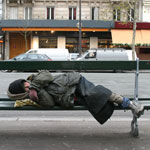My Financial Implosion: Avoiding Homelessness
 ‘œWe think sometimes that poverty is only being hungry, naked and homeless. The poverty of being unwanted, unloved and uncared for is the greatest poverty. We must start in our own homes to remedy this kind of poverty.’ ‘“ Mother Theresa
‘œWe think sometimes that poverty is only being hungry, naked and homeless. The poverty of being unwanted, unloved and uncared for is the greatest poverty. We must start in our own homes to remedy this kind of poverty.’ ‘“ Mother Theresa
Last Thursday afternoon, my new neighbor knocked on my door, visibly upset. He’s an out-of-work mechanic who moved across state lines to accept a job, only to find the offer rescinded when he arrived, due to the recession. His wife is ill; they no longer have medical insurance, and are out of money. I’d spoken to him several weeks before about replacing the clutch on our aging station wagon, and he wanted to know if there was any way he could start on the job to earn some money to buy medicine for his wife.
Although the bad economy has hurt us and my wife no longer has a steady contract, my neighbor’s request for help really hit me hard. I’ve been where he is now, and it’s a scary, upsetting place to be. The only reason he and his wife are not homeless, he told me, is because he is staying with relatives.
My wife and I quickly discussed the situation, and decided to re-prioritize our spending this month. We ordered the replacement clutch kit, moved our car into the neighbor’s garage, and gave him a small advance on his labor charge so he could purchase his wife’s medication.
With the down economy, the numbers of homeless are swelling as the middle class teeters on the brink. This reminds me of my own brush with near homelessness, and the nearly four years I spent living in a small travel trailer.
So, what can you do to prevent yourself from becoming homeless in the event you lose your job, or are faced with some other financial disaster?
1. Before you sign a rental agreement, lease, or purchase contract, see that your new home costs less than what you can afford. Make sure, before you move in, that you’ll have some wiggle room in your budget for the lean times.
2. Make sure you have adequate insurance. Appropriate health, auto, life and homeowner’s/renter’s insurance can go a long way to protecting you and your loved ones from financial disasters.
3. If you live alone and plan to live alone, consider selecting housing that is well-designed for sharing. Although having a roommate isn’t everyone’s first choice for a housing arrangement, having that option open can be a lifesaver in an emergency.
4. Pay for your housing first. Treat your monthly rent or mortgage payment as a sacred cow. Pay it first, and on time, for as long as you possibly can. Other bill collectors can threaten, harass, and scream all they want, but they can’t put you out on the street if you do not pay them.
5. If you find yourself facing foreclosure, act quickly. Contact your lender immediately and try to negotiate some sort of agreement that will keep you in your home. If that fails, call for professional housing preservation help.
6. In times of financial difficulty, make an effort to keep your family and social ties strong. Not only can your friends and family give you valuable emotional support and perhaps a few job leads, they may be able to offer you a place to stay while you get back on your feet.
7. If you own a boat or an RV, especially if it’s paid for, consider using it as a backup plan. When I bought my first travel trailer, I only had summer fun in mind. I never thought that I would find it such an invaluable resource.
8. If you lose your job, don’t delay applying for unemployment benefits. Being ‘œtoo proud’ to apply for governmental aid only hurts you. You’ve paid your taxes while you were working; make sure you get what you are entitled during times of trouble. This also holds true for applying for things like food stamps, section 8 housing or welfare benefits. Learn the eligibility rules in your state and apply right away.
9. Don’t be afraid to ask for help. In this area, it’s almost always easier to give than to receive, so it’s important to recognize when you need assistance from others. Contact friends, family and social service agencies if you need help.
10. If the loss of your home is imminent, make avoiding homelessness your full time job. Look for new work, be persistent in your search for help, and do not give up. Once you fall into homelessness, it’s much more difficult to work your way back.
Having been so close to complete homelessness, I find myself constantly reviewing my contingency plans as the economy worsens. Although, at least for now, our future isn’t in danger, I still find myself worrying. It’s much easier not to worry if you can maintain the mindset of ‘œit could never happen to me.’ In my case, it did happen, and it could happen again.
Have you ever had a brush with homelessness or near homelessness? What did you to do to help yourself?
Next in series: Credit After Bankruptcy
Photo credit: stock.xchng


Alex, thanks for sharing this. I have been on the brink of homelessness twice. I’m grateful that I’ve had friends who have put me up on their couch.
I agree with you. I always pay rent first – with a cashiers’ check so I know the rent check will never bounce. I’ve had power and water cut off before, and I’ve even lost my phone service. But I have never been evicted. Rent comes first. I’ll eat ramen noodles if I have to.